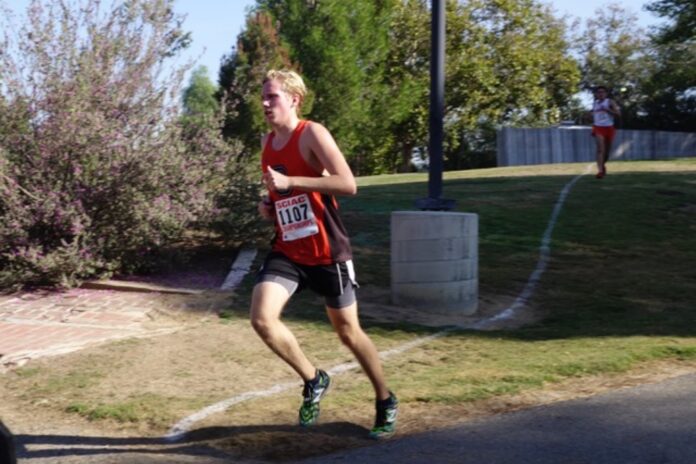Student-athletes pour enormous amounts of their time into their sports, putting their bodies through immense strain readying themselves for competition, while at the same time constantly risking injuries that could jeopardize their seasons, according to Ethan Henes (senior), a runner on Occidental’s track and field and cross country teams. Henes has been suffering from sesamoiditis, a foot injury, since July 2021, and is currently unable to compete or participate in normal training.
“Even at a D3 level, the time commitment that you’re putting towards the sport is pretty extraordinary,” Henes said. “I don’t think you can really understand the frustration that someone has when they spend an entire semester training and putting in all this work, and then not seeing any benefit and not ever going to race, as a regular student.”
Due to the COVID-19 pandemic putting college sports on hold, the Fall 2021 semester would have been Henes’ first season running since sophomore year, had his injury not prevented him from competing. As a first-semester senior, this track season is his last with his teammates in his year, and the Fall 2022 cross country season will be his last at Occidental.
Daniel de Leon (senior), another runner, tore his hamstring at the first race of the season in February, and has been unable to compete or practice with the rest of the team during his last semester at Occidental.
“It makes you realize how short college is,” de Leon said. “It’s like, ‘Oh, how much time do I have left? How many competitions? How many seasons do I have left?’ You’re more aware of how little time we actually have on campus.”
Megan Armentrout (senior) also feels the end of her time training at Occidental closing in. Armentrout said as a pole vaulter, this season could be her last chance to compete in her sport since pole vault is difficult to continue after college. Because of the pandemic, Armentrout said her first year was her only full year to train and compete.
“That is kind of disappointing,” Armentrout said. “That’s not when I peaked yet.”
According to tennis player Katie Wolber (senior) it can be hard to know when she is hurting herself, since she is used to pushing through pain while playing. Wolber said she recently hurt her knee during a match, but has been dealing with persistent injuries since she was 11.
“I love tennis, and I’ve always played tennis,” Wolber said. “I enjoy matches, I enjoy competition, and I don’t want to stop — it’s always a balance when you’re dealing with ongoing injuries. It’s sometimes hard to know the limit. ‘Okay, well this hurts, but am I doing more damage while I continue?’”
Henes said he exacerbated his injury by continuing to train, before realizing what exactly the problem was. According to Henes, he spent his whole season training and rehabbing to compete in the last race, but this only made his injury worse.
“In that moment, where I knew that I had ruined my chance of getting to do this thing that I really want to do — I’ll be pretty candid — I kind of flipped out,” Henes said. “I was in a really bad emotional and mental state.”
Henes said that his teammates understood what he was going through and continue to support him, but that the disappointment he felt after dedicating so much time to his sport is hard to bounce back from.
Wolber said although it hurts to not be able to play, she is close with her teammates and has been able to stay highly involved with the team, especially as a team captain.
“Even though I can’t play, I can still directly help my teammates,” Wolber said. “I’m always the person who shows up with a bag of extra uniform tops, and snacks, and Advil, and salt tablets and all of that. So I have that other responsibility — still just trying to do what I can to support my teammates.”
According to de Leon, the sense of community among runners is very strong, and despite not being able to do what he is really there for he does his best to stay positive.
“It’s a team environment on track,” de Leon said. “It’s less emphasized because it’s such an individual sport, but you are constantly in grueling pain with everyone. So you bond with these guys a lot. It’s one of my favorite parts about being in school.”
Henes also said not being able to run with his teammates is one of the hardest parts of being injured.
“It definitely is really sad, seeing those buses leave and walking in the group of four or five of us that cross-train, going to do our own thing,” Henes said. “This entire group of people I want to spend my time with is going off.”
Still, Henes said seeing his teammates continue to work hard and break personal records coming back from time off due to the pandemic has been inspiring.
“The mentality I have now is just work as hard as I can and just see what happens at the end of the season,” Henes said. “And if I get to run, I get to run, and if I don’t, you know, I’ll hop in for a short race. I’ll walk down the last 100 meters and bow to the crowd.”
![]()































